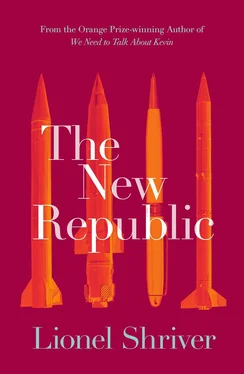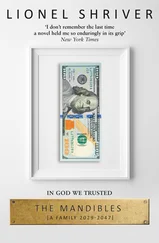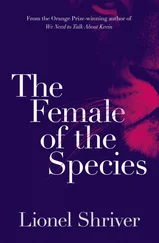Fuck it. Edgar gathered the train and swirled out of the bedroom with a little transvestite flounce, assured that you could get away with anything so long as you did it with conviction.
Nicola was right: the house was enormous. Edgar’s disgust that the National Record would coddle any correspondent with such palatial accommodations failed to undermine exultation at his own good fortune. Aside from the one tiny round tower, the villa rose only two stories high, but spread across what must have amounted to half a New York City block. Its Moorish architecture expressed the clean, wide lines of Frank Lloyd Wright fare, without the iciness of modernity. Hanging tapestries and Oriental carpet softened the perpendiculars of mosaic tile and marble parquet. Downstairs was constructed on a variety of levels, the floors landscaped into benches cushioned with rotund pillows. The dining area’s table, like the bath, was sunken.
Though the western windows looked frosted, their panes were pitted irregularly: dulled by gale-borne sand. When the wind would poom a door against its frame, like a body slammed from the patio, it took practice not to jump.
Edgar’s favorite room at ground level was the atrium: open and Romanesque, lit by skylights slit around the ceiling, and organized around a rectangular pool whose fountain still plashed in Saddler’s absence. The atrium called out for scantily clad slave girls offering fleshy grapes, palm-leaf fans, and a flow of red wine as ceaseless as the fountain. While Edgar formed an instantaneous affection for the hall, it also made him nervous. Lassitude! Indiscipline! Sloth!
In fact, the entire villa was imbued with an indulgent sensibility to which Edgar was constitutionally hostile. The drinks cabinet clinked with a bonanza of top-shelf booze. Beckoning pillows plumping every room made Edgar’s head list and his eyelids heavy. Numerous guest bedrooms invited all-night social excess. The pantry, chock-full of absurd gift tins and jars—hazelnuts in Cointreau, glacé cherries, pickled quail eggs, smoked baby oysters—enticed three a.m. binges when no one was watching. Though the airy kitchen was fitted with every convenience, Edgar couldn’t picture Saddler chopping onions, and sure enough there was a Post-it note gummed to the Silver Palate Cookbook : “B, Could I leave this here for next time? See page 46—yum! —E.”
Since Edgar could no more envision Saddler plowing through The Peloponnesian Wars in original Greek than slicing zucchini, the upstairs study’s glassed-in leather-bound library—rows of erudite European histories and biographies in multiple languages from Flemish to Hungarian—was expensive paneling.
It was the study that showcased the got-the-T-shirt trinkets of a foreign correspondent, keepsakes that recalled the We Were There series that Edgar had devoured as a kid. In We Were There at Pearl Harbor … at Appomattox … at the Boston Tea Party , a pack of lucky brats always popped up at the right time and place. He should have told Wallasek that he quit being an attorney in order to jump between the covers of We Were There before it was too late, since no one was about to write a book about kids who serendipitously visit a corporate law firm in a season of hostile takeovers.
At any rate, Barrington Was There . The room overflowed with souvenir booty: a rifle slug, a rubber bullet, a melted metal bicycle pump, a human skull with a patch of scalp sun-dried to the bone. A U.S. Army C-ration kit gritty in the crevices may have commemorated the Gulf War or the invasion of Panama; a tin ladle cleverly fashioned from a can of potted beef, marked “Gift of Finland,” must have been saved in fond remembrance of a famine.
On the wide, curly maple desk sat a clear, catering-size mayonnaise jar, the sort coveted in primary school for terrariums. It brimmed with coins, from rands to bahts, including currencies, like the Zaire, that had become so devalued that its silver was no longer minted. Next to this cosmopolitan piggybank lay an unopened letter from Amnesty International addressed to Mohamed Siad Barre, a Spider-Man comic book in Russian, and a sheet of ghoulish “AIDS Has No Cure” postage stamps from Kenya. The left-hand desk drawer was brimming with electoral buttons: Vote for Marcos, Mengistu, Mobutu, Duvalier, Rabin … Mostly demagogues, plus Rabin had been assassinated: quite a cynical tribute to democracy. One file opened on the desk appeared to include every SOB atrocity claim and policy statement ever issued; another drawer rattled with microfloppies alluringly labeled SOB STORIES. The floppies could save Edgar some work.
A set of three-ringed notebooks lined one bookshelf, and Edgar pulled the first volume: Saddler’s clip files. Edgar scanned the initial feature, an impassioned exposé about Thai prostitution—the slave wages, diseases, indentured servitude. Touching, if overwritten. But reading is the ultimate submission. Edgar shoved the notebook back. Turning gruffly from his predecessor’s accomplishments, Edgar started as a pair of eyes met his own.
Well, well. The big, big, big man in the foreground of that black-and-white enlargement had to be none other than Himself. Saddler was seated on the downstairs ottoman, bulwarked by pillows. His barrel-chest burst with such self-satisfaction that it strained the rhinestone buttons of the tuxedo shirt. His eyes sparked with the sinister twinkle of Santa Claus paging kiddy porn. And his right arm was hooked in a virtual headlock around Nicola .
Edgar was consternated. Sure, he’d caught the wink-and-nod in Wallasek’s office, but that was before he’d met her and before he knew she was married. Edgar was mystified why such an elegant and estimable woman would muck in with a scumbag like Saddler.
Yet a second revelation rankled more considerably.
Edgar had verified in childhood what the New Testament only hints at. Yes, mobs will reprieve murderous hooligans before they acquit a babbling messianic head case; Barabbas was merely wicked, and Jesus was actually irritating. What the Bible failed to illustrate was Edgar’s personal Apocrypha: that people will exonerate sadists, braggarts, liars, and even slack-jawed morons before they’ll pardon eyesores. If you’re attractive, people need a reason to dislike you; if you’re ugly, people need a reason to like you. They don’t usually find one. In his tubby school days, Edgar had learned the hard way that every vulgar slob on the block was an aesthete.
Now along comes this absentee paragon, about whom no one from New York to Cinzeiro can stop talking for more than ten minutes even using a stopwatch, and guess what? Barrington Saddler wasn’t even handsome.
Saddler was built like a grain silo. Drawn practically into his lap, Nicola looked like a stick puppet in comparison. His eyelids were swollen, his cheeks loose; he had an infant double chin. Some great frames afforded no end of abuse, but in a few years’ time the likes of that full back-up case of Beefeaters in the pantry would begin to show. His lips had a faintly feminine fullness, and his neck was thick. His features were pinched, gathered too closely into the middle of his face, as if someone had laced a drawstring around its perimeter and pulled. Though shaggy around the ears, in front his hair was thin. This was no Romeo, but a sybaritic lout well on his way to a stout and gouty middle age. How did he do it?
Defiantly, Edgar tossed the golden robe onto an overstuffed leather armchair. He began his daily one hundred push-ups, keeping his back perfectly straight, lowering his nose fully to the floor. From overhead, Saddler seemed to find the hale-and-hearty exhibition bemusing. For no reason that Edgar could fathom, he stopped at ninety-nine.
Читать дальше












